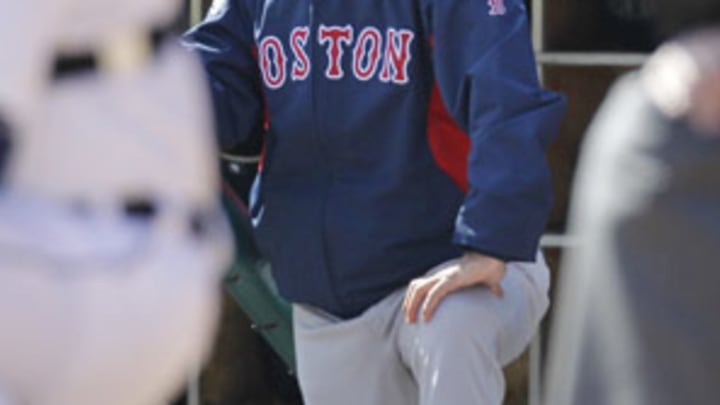Early clubhouse drama could be trouble for Valentine, Red Sox

Blaming Terry Francona is one thing, but expecting a guy like Valentine -- long on baseball acumen but short on verbal filters -- to provide a calming influence to a team in turmoil was, at best, a crapshoot. Not yet two weeks into the 2012 regular season, Valentine is embroiled in his first controversy.
It may seem innocuous, going on television and saying that Kevin Youkilis is not "as physically or emotionally into the game as he has been in the past." It was a phrase amid an otherwise complementary comment; Valentine is obviously invested in Youkilis' success, and he made sure to note that his third baseman's slow start appears to be turning around.
None of that matters, of course. In baseball, a manager's primary duty away from the field is to protect his players at any cost, usually from the media, at least until the point that a player leaves him no other option. If Youkilis has somehow already reached that point with Valentine, if his manager felt that calling him out in a local television interview was the only recourse left to reach him, well, that would constitute a newsworthy story. Other than his manager's off-the-cuff banter, however, there is no indication that this is the case.
Instead, Valentine and the Red Sox are left to deal with the fallout, which serves to illustrate precisely why managers are expected to be measured in public statements about their players. Now, instead of coming to the ballpark and focusing on the game at hand, Youkilis has to answer questions about his manager's lack of confidence, in addition to questions about his slump. Now, Dustin Pedroia, a team leader, has to step back from his own preparations in order to defend his compatriot. Now, the rest of Boston's players have to wonder what it might take before their manager publicly questions them, as well. Now, Valentine, the man brought in to help manage a media circus, has added a ring to the big top, and -- inadvertently or not -- is forcing his players to dance through hoops before they reach the field.
The unwritten rule to protect your players is why Whitey Herzog refused to admit that Keith Hernandez's drug use (and his subsequent untruths when discussing it) was a motivating factor in his being dealt to the Mets in 1983, even as the manager took considerable grief for the deal.
This rule is why Joe Torre, after Roger Clemens threw a bat shard at Mike Piazza during the 2001 World Series, refrained from storming out of his postgame interview amid a battery of leading questions. He knew Clemens was to follow him in front of the press, and wanted to absorb the difficult queries himself.
This rule is why Tony La Russa defended Jose Canseco long after steroid accusations against him became part of the public dialogue, and it is likely why he continued to defend Mark McGwire against similar charges after even many of his staunchest defenders had long since given up.
This rule is why Arizona manager Bob Brenly so vociferously attacked Ben Davis in the press following the Padres catcher's bunt single that broke up Curt Schilling's perfect game in 2001. It was less because Brenly was angry at Davis, he said, and more because he wanted his pitcher to know that he "was looking out for his interests."
For a clear comparison, consider two baseball stories, both of which involve pitchers being pulled from games in which their teams led by identical 4-2 scores. In one, A's manager Ken Macha discussed with the press the fact that Barry Zito removed himself from the penultimate game of the 2004 season, with the division on the line against the Angels, after 114 pitches. Zito logged seven full innings, but Oakland's bullpen gave up three quick runs, and Anaheim went on to win the game and a spot in the postseason. There was heat for pulling an effective pitcher, and Macha wanted no part of it.
In the other, Tigers manager Mayo Smith opted in 1969 to keep quiet about the fact that he pulled his own starting pitcher, Denny McLain, with one out in the sixth inning, after McLain warned him that he was tiring. Reliever Darryl Patterson came on and gave up, in order, a single, a walk, a sacrifice fly and a three-run homer; Detroit lost, 6-4.
Afterward, with media speculation raging about Smith's decision to remove his star pitcher so early, the manager refrained from divulging the fact that McLain had effectively removed himself, not to mention that he had left the park altogether by the eighth inning. Smith kept quiet even when telling the truth would have deflected criticism. Valentine didn't even have that for motivation.
Valentine has publicly apologized to Youkilis, but Red Sox players may already be questioning what kind of manager they want to play for. If that's the case, Valentine has far bigger things to worry about than Kevin Youkilis' early-season hitting woes.
